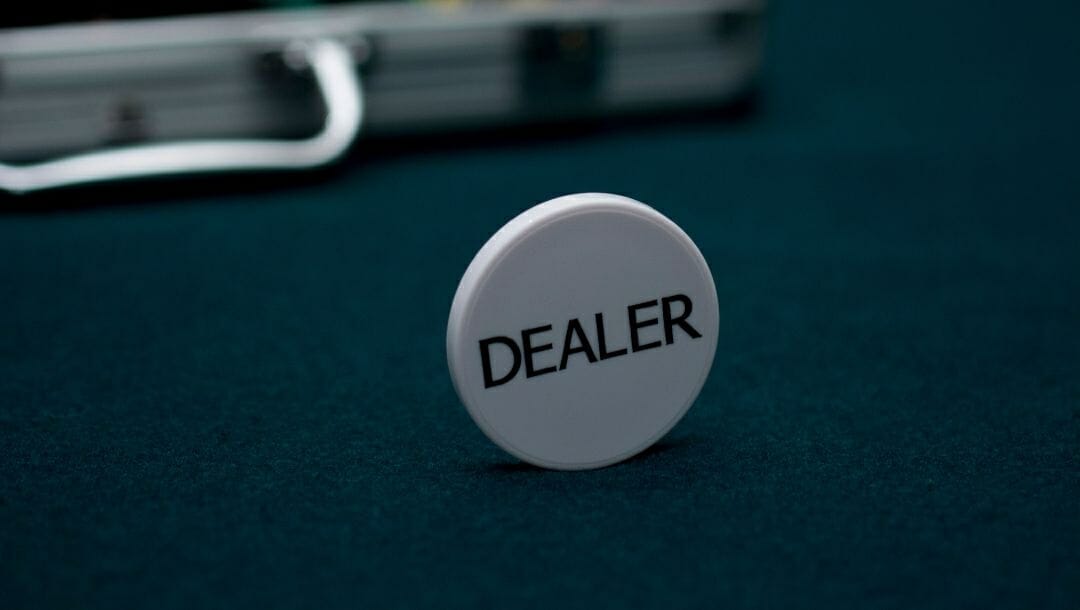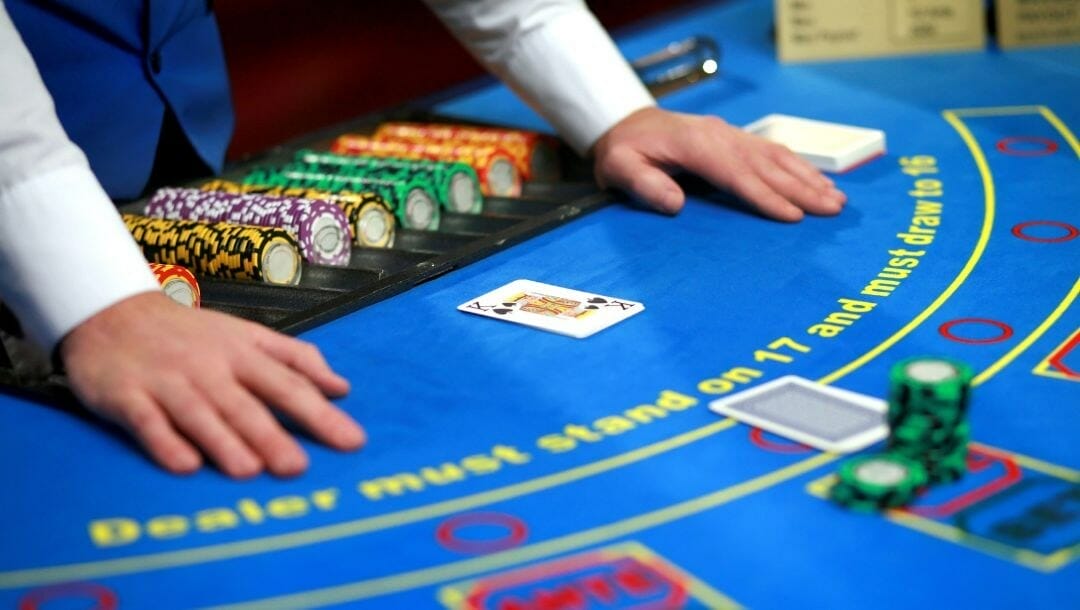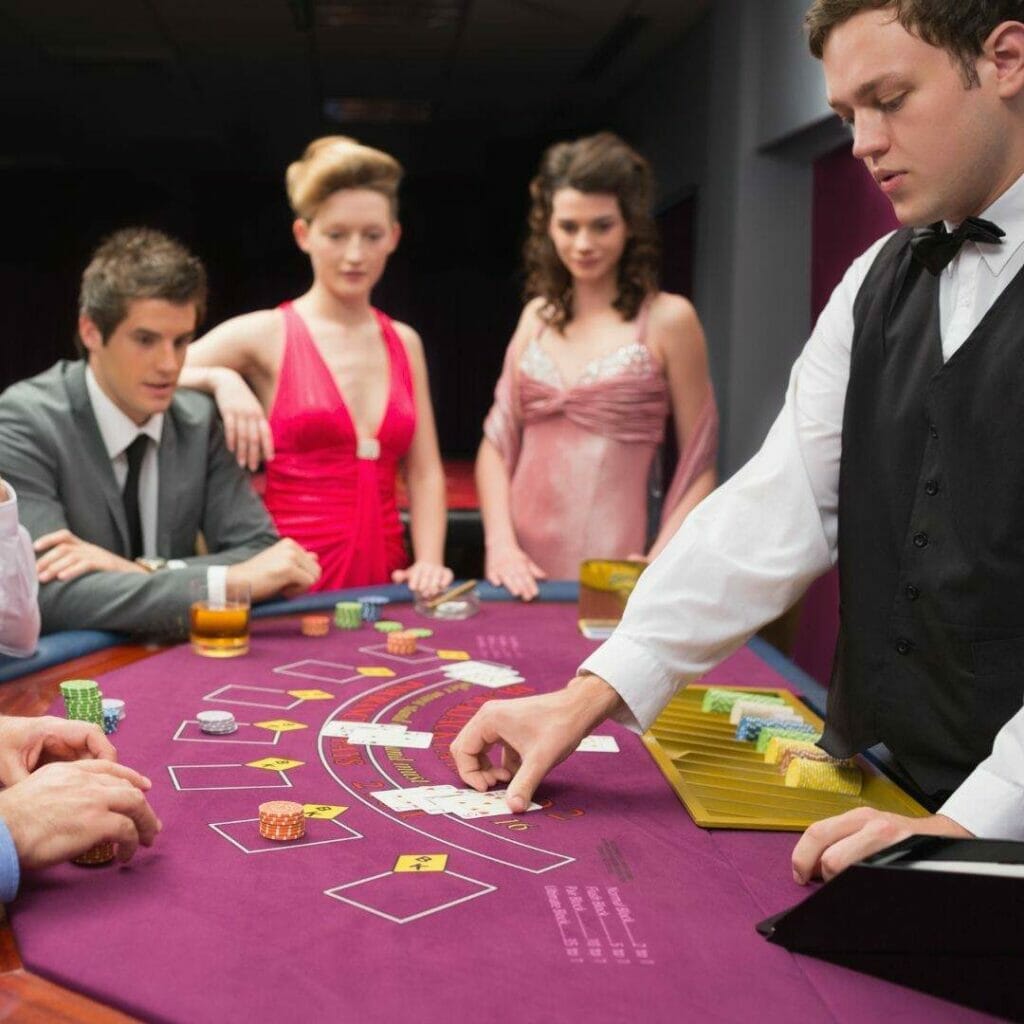
You may not know this, but blackjack began in 17th and 18th century Europe as a combination of various card games such as “Vingt-et-Un” and “Seven-and-a-Half” before it found its way to the gambling halls of America.
A few decades later, US casinos decided to spice it up a little and began offering a special payout for the combination of an ace of spades and a black jack, giving birth to the name “blackjack.” The rest is, as they say, history. Today, blackjack is one of the most played casino table games in the world.
Let’s spend some time unpacking the basic rules of blackjack and look at important dealer rules that may impact the way you play the game.
How to Play Blackjack
Now that you’ve found a table you’re happy with, you can start playing the game. Although the basic gameplay and rules of blackjack are the same for most variants played in casinos, it’s still worth checking out the rules of the casino you’re at before playing.
Here’s a short guide on how to play:
- Each player places their bet on the table.
- The dealer deals two cards face-up to each player, including themselves. The players’ cards are usually face-up, while one of the dealer’s cards is face-up (the “upcard”) and the other, face-down (the “hole card”).
- The numerical value of each card corresponds to its face value (2-10), while face cards (jack, queen, king) count as 10 and an ace can be counted either as 1 or 11, depending on the player’s choice.
- Starting from the left, each player makes decisions about their hand. The main options are:
- Hit: Request an additional card to increase the hand’s value.
- Stand: Decline any more cards and keep the current hand value.
- Double Down: Double the initial bet and receive one additional card before automatically standing.
- Split: If the player’s initial two cards are of the same value, they can split them into two separate hands and place an additional bet.
- If a player’s hand value exceeds 21, they “bust” and automatically lose their bet.
- Once all players have completed their turns, the dealer reveals their hole card.
- If the dealer’s hand exceeds 21, they bust, and all remaining players win.
- If the dealer’s hand does not exceed 21, they compare their hand to each player’s hand. Players with a higher hand value than the dealer’s win even money on their bets. Players with a lower hand value lose their bets, and players with the same hand value push (tie) that is, get their money back.
- Blackjack, also known as a natural, occurs when a player or the dealer is dealt an ace and a 10-value card as their initial two cards. A natural pays out at higher odds, usually 3:2.
How To Deal in Blackjack

Knowing blackjack dealer rules can seriously influence your approach to the game and help you make better decisions. Here is a short guide to dealer rules in blackjack:
- The dealer must deal cards to all players at the table, starting from their left and going clockwise.
- The dealer will then deal themselves two cards, one facing up (the “upcard”) and the other facing down (the “hole card”).
- If the dealer’s upcard is an ace, they will offer insurance to the players. Players have the option to place a side bet on whether the dealer’s hole card is a 10-value card (10, jack, queen or king) to form a natural blackjack.
- If the dealer’s upcard is a 10-value card or an ace, they will check their hole card to see if they have a natural blackjack. If they do, the game ends, and all players who do not have a natural blackjack lose their bets.
- If the dealer doesn’t have a natural blackjack, the game continues and the players make their playing decisions before the dealer plays their hand.
- The dealer must follow a specific rule for drawing additional cards. Typically, if the dealer’s hand is valued at 16 or less, they must draw another card (hit). If the dealer’s hand is valued at 17 or more, they must stand (not draw any more cards).
- If the dealer busts (their hand value exceeds 21,) all players who are still in the game and haven’t gone bust, automatically win.
- Once all players have completed their turns, the dealer reveals their hole card. If their hand value is 17 or higher, they must stand. If their hand value is 16 or lower, they must draw additional cards until they reach a value of 17 or higher.
- The dealer compares their hand to each player’s hand. Players with a higher hand value than the dealer’s win even money on their bets. Players with a lower hand value lose their bets, and players with the same hand value push (tie) or get their bets back.
How Dealers Can Affect the Game
While there isn’t too much room for a dealer to deviate from the casino’s blackjack dealer rules, how they deal and how they implement some of the more ambiguous rules can have an effect on the outcomes of the game. Here are some ways in which dealers can affect the game.
Following Rules
This is the most obvious one. Dealers must adhere to specific rules when playing their hand. These rules can vary depending on the casino and blackjack variant being played but tend to be the same in most cases. How dealers follow these rules, such as hitting or standing on certain hand values, can affect the overall outcome of the game.
Decisions on Soft 17
In some blackjack variations, dealers are required to hit on a soft 17 (a hand containing an ace valued as 11). Others may require them to stand. This rule can impact the dealer’s potential hand value which will definitely influence how you play your hand.
Dealing Speed
The speed at which a dealer handles the cards can also affect the game. A faster dealer may cause more hands to be played in a shorter period, potentially leading to increased losses or wins for players while also weeding out the novices from the pros.
Player Interaction
Dealers interact with players throughout the game, creating an atmosphere and setting the tone for the table. Their attitude, professionalism and ability to maintain the flow of the game can impact players’ experience and overall enjoyment. But it’s also a way of breaking players’ concentration and distracting card counters.
A Few Rules To Remember That May Help You Win

Depending on the casino and variant you’re playing, there are a few other rules that you may want to familiarize yourself with in order to get an edge over your opponents and the house.
Five-Card Charlie
Some variations of blackjack have a rule called “Five-Card Charlie.” It states that, if a player manages to draw five cards without going over 21, regardless of the dealer’s hand, they automatically win the round.
Double Exposure
In the Double Exposure variant, both the dealer’s cards are dealt face-up. This gives players more information about the dealer’s hand but comes with rule adjustments such as the dealer winning on ties or other specific restrictions on player actions.
Surrender
Certain blackjack games offer the option to “surrender” a hand. This allows players to forfeit half of their bet and retire from the round if they feel they have a weak hand, avoiding potential losses against a strong dealer hand.
Bonus Payouts
Some casinos offer additional bonus payouts for specific card combinations. For example, getting a certain combination of suited cards (for example, ace and jack of spades) can result in an extra payout.
Side Bets
Side bets are optional wagers that can be made alongside the main blackjack game. These bets are independent of the regular hand and often involve predicting specific outcomes, such as the player’s initial two cards or the total number of cards in a round. A typical example is the Super 7 side-bet which can pay out up to 5 000 to 1 for three suited 7s.
Try Blackjack With Borgata Online
Register with Borgata Online and get to grips with online blackjack. Go one step further and try live dealer blackjack with our online live blackjack dealers along with some other live dealer casino games such as poker and baccarat. Card games not doing it for you? Find out how to play slot tournaments or take on any number of other online casino games available at Borgata Online.
